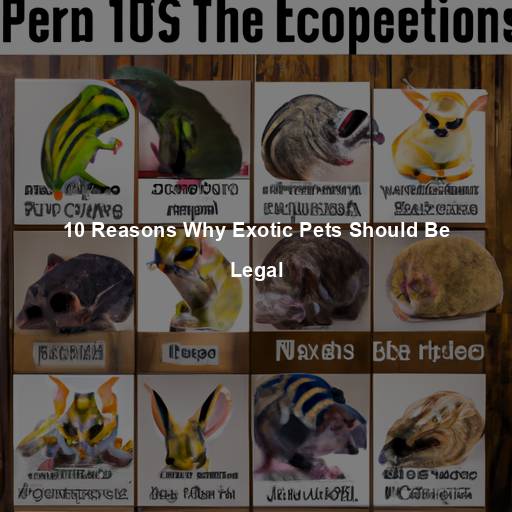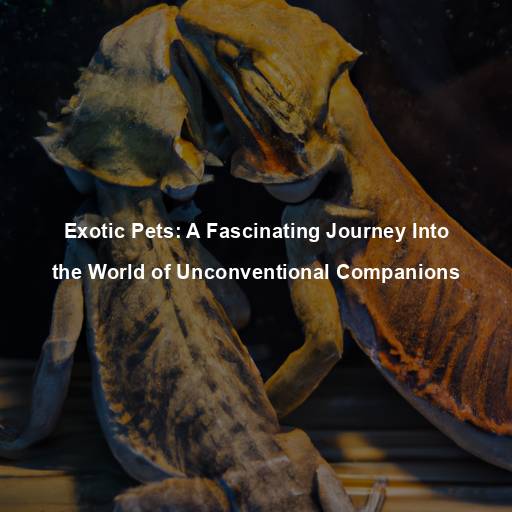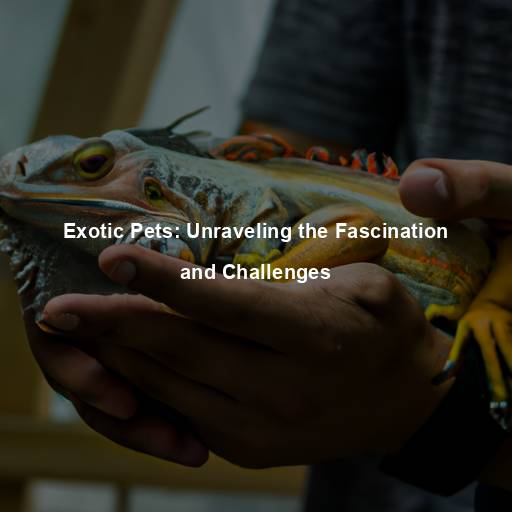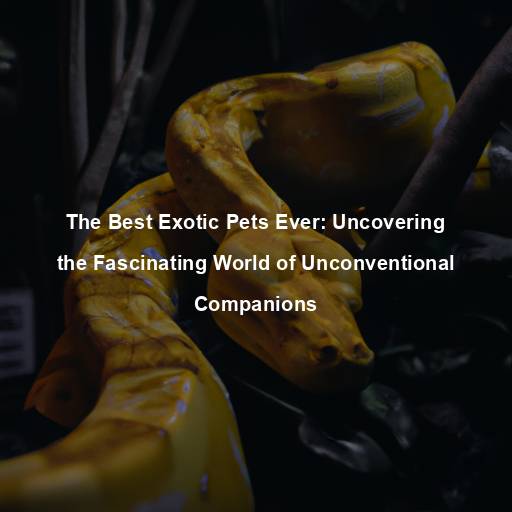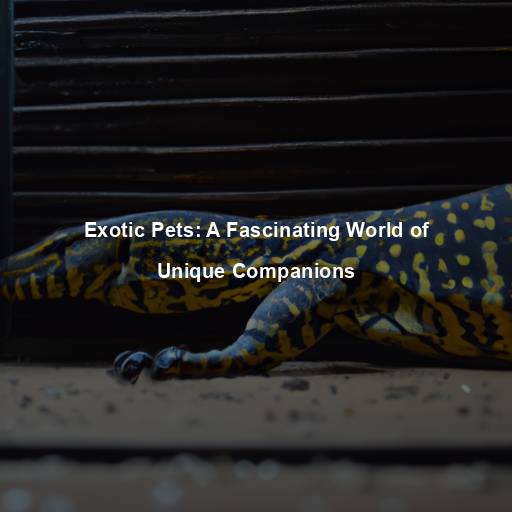10 Reasons Why Exotic Pets Should Be Legal
Last Updated on August 8, 2023 by Evan
Contents [hide]
- 1 The Fascinating World of Exotic Pets
- 1.1 Personal Freedom and Choice
- 1.2 Educational Opportunities
- 1.3 Conservation Efforts
- 1.4 Economic Benefits
- 1.5 Responsible Regulation
- 1.6 Mental Health Benefits
- 1.7 Responsible Pet Ownership
- 1.8 Cultural Significance
- 1.9 Reduced Black Market Trade
- 1.10 Responsible Pet Industry
- 1.11 Ethical Concerns
- 1.12 Environmental Impact
- 1.13 Disease Transmission
- 2 Addressing the Concerns
- 3 A Balanced Approach
- 4 Learning from Successful Case Studies
- 5 The Role of Public Awareness and Education
- 6 FAQs: 10 reasons why exotic pets should be legal
- 6.1 Q: What exactly are exotic pets?
- 6.2 Q: Why should exotic pets be legal?
- 6.3 Q: Won’t the legality of exotic pets increase the risks to public safety?
- 6.4 Q: But aren’t exotic pets more prone to being mistreated or neglected?
- 6.5 Q: How can legalizing exotic pets benefit conservation efforts?
- 6.6 Q: Will legalizing exotic pets lead to an increase in illegal wildlife trafficking or smuggling?
- 6.7 Q: What impact can legalizing exotic pets have on the economy?
- 6.8 Q: Won’t legalizing exotic pets disrupt ecosystems if they are released?
- 6.9 Q: Is there scientific evidence that supports legalizing exotic pets?
- 6.10 Q: What safeguards would be in place to ensure that exotic pets are acquired responsibly?
The Fascinating World of Exotic Pets
The allure of exotic pets has forever entranced us mere mortals, stirring an insatiable curiosity for the wonders of the wild. Immerse yourself in a world where vibrant reptiles and mesmerizing big cats reign supreme, casting a spell upon our mundane existence. But alas, a fierce debate rages on the legality of embracing these extraordinary companions. Fear not, for we delve into the enigma, presenting ten persuasive arguments fueling the case for the legality of owning exotic pets.
Personal Freedom and Choice
One of the fundamental principles of a democratic society is the freedom to make personal choices. Allowing individuals to own exotic pets respects their right to pursue their own interests and passions. Just as some people prefer cats or dogs as companions, others find joy in the company of more exotic creatures. By legalizing the ownership of exotic pets, we acknowledge and embrace this diversity of preferences.
Educational Opportunities
Exotic pets provide unique educational opportunities, especially for children. Owning and caring for these animals can teach valuable lessons about biology, conservation, and responsible pet ownership. Learning about the specific requirements of different species promotes a deeper understanding of the natural world and fosters a sense of empathy towards all living creatures.
Conservation Efforts
Many people hold the misconception that legalizing the ownership of exotic pets has negative consequences, but let me burst that bubble for you. In fact, the truth is quite perplexing. It turns out that legalizing the ownership of these exotic creatures can actually be beneficial for conservation efforts. The reason behind this lies in the hands of responsible breeders and owners who diligently participate in captive breeding programs.
Economic Benefits
Legalizing the ownership of exotic pets can have a positive impact on local economies. From pet stores specializing in exotic species to veterinary clinics offering specialized care, the industry surrounding exotic pets can create jobs and stimulate economic growth. Moreover, the increased demand for exotic pet supplies and services can lead to innovation and advancements in animal care practices.
Responsible Regulation
In an era where the allure of exotic pets is undeniably captivating, it’s important to steer away from a hasty prohibition and instead focus on prudent regulation to safeguard the wellbeing of these magnificent creatures and their caregivers. By introducing licensing requirements, fostering educational programs, and conducting thorough inspections, we can cultivate a harmonious environment where both owners and animals thrive. Embracing this approach allows us to navigate the complex realm of personal freedom while ensuring the ethical treatment of these extraordinary creatures.
Mental Health Benefits
The incredible power of pet companionship has been widely acknowledged for its ability to brighten our lives and uplift our spirits. But beyond the joy that traditional pets bring, there exists a fascinating world of exotic pets, each with its own enchanting personality and mesmerizing behaviors. With their exotic allure and mystique, these unique creatures have the potential to offer a whole new level of solace and companionship, especially for those grappling with emotional hurdles or battling the melancholy of loneliness. The mere presence of an exotic pet can work wonders, providing that much-needed solace and unwavering emotional support that can make all the difference in one’s journey towards healing and self-discovery.
Responsible Pet Ownership
Owning an exotic pet requires a higher level of commitment and responsibility compared to traditional pets. The unique needs and specialized care required by these animals necessitate owners to educate themselves and invest time and resources in their pets’ well-being. By legalizing exotic pet ownership, we encourage responsible pet ownership and discourage impulse purchases or illegal trade.
Cultural Significance
The captivating allure of exotic pets transcends borders and ignites fascination among diverse cultures. These magnificent creatures embody a rich tapestry of tradition and heritage, revered as symbols of cultural significance. Balancing the scales of preservation and responsibility, the legalization of exotic pet ownership allows us to navigate the delicate intricacies of upholding these cherished customs while paving a path towards sustainable coexistence.
Reduced Black Market Trade
Prohibiting the ownership of exotic pets often leads to an increase in the black market trade of these animals. This underground market not only fuels illegal activities but also puts the animals at risk. By legalizing exotic pet ownership, we can reduce the demand for illegal trade and promote a transparent and regulated market that prioritizes the welfare of the animals.
Responsible Pet Industry
With the potential legalization of owning exotic pets, a world of possibilities opens up for a conscientious and transparent pet industry. By implementing a system of licensing, regulation, and oversight, we have the power to guarantee that the breeding, transportation, and sale of these animals are carried out with utmost care and ethics. This not only safeguards the well-being of the exotic creatures and those who desire to own them, but also eradicates the demand for illicit and unregulated practices that currently prevail.
Ethical Concerns
The debate surrounding the controversial subject of legalizing exotic pet ownership is a swirling vortex of conflicting opinions. On one side, proponents argue that humans have a right to coexist with majestic creatures from far-flung lands, while others vehemently proclaim the ethical conundrum of depriving these animals of their natural habitats. Additionally, concerns are raised about the daunting challenge of ensuring proper care and treatment for these exotic pets, as not everyone possesses the necessary expertise or financial means. The maelstrom of opinions leaves us pondering the perplexing question of whether the allure of owning these magnificent creatures outweighs the potential pitfalls of their captivity.
Environmental Impact
As the great debate rages on, a perplexing question emerges from the depths of our consciousness: what about the environmental ramifications of exotic pets? With burstiness akin to a thunderstorm, advocates argue that the introduction of these non-native creatures into unfamiliar habitats can send shockwaves through delicate ecosystems, jeopardizing the very existence of native wildlife. One compelling example that repeatedly surfaces is the plight of the magnificent Burmese python slithering in the Florida Everglades, whose insatiable predatory instincts have become a desperate threat to the local species. Like a symphony of perplexity, critics raise their concerns, fearing that the legalization of exotic pet ownership may inadvertently intensify these already precarious ecological imbalances, unleashing an unpredictable chain reaction of consequences.
Disease Transmission
There is also concern about the potential for disease transmission from exotic pets to humans. Some exotic animals, such as reptiles, may carry bacteria such as Salmonella, which can pose health risks, particularly to young children and individuals with compromised immune systems. Critics argue that legalizing exotic pet ownership could increase the likelihood of such diseases being spread within communities.
Addressing the Concerns
Implementing Stricter Regulations
To address the ethical concerns associated with exotic pet ownership, it is crucial to establish and enforce stricter regulations. These regulations should focus on ensuring that potential owners have the necessary knowledge, resources, and commitment to provide adequate care for these animals. By setting higher standards for ownership, we can mitigate the risk of mistreatment and neglect.
Educating Potential Owners
In the world of pet ownership, the importance of education cannot be overlooked when it comes to exotic pets. By equipping prospective owners with a wealth of knowledge about the particular requirements, behaviors, and care routines necessary for these magnificent creatures, we can ensure responsible pet ownership. It is essential to make educational programs and resources easily accessible, empowering individuals to fully grasp the responsibilities and intricacies that come with owning these extraordinary beings. In doing so, we pave the way for a harmonious coexistence between humans and their exotic companions.
Promoting Conservation Efforts
In the realm of environmental consciousness, the spotlight gravitates towards the paramount need for conservation endeavors. In tandem with the contentious quandary of legalizing exotic pet ownership, it is essential to deploy synergistic measures that galvanize the backing of conservation organizations and propel research initiatives designed to safeguard imperiled species and their dwellings. By dedicating resources and funneling funds towards the sphere of conservation, we hold the potential to assuage the conceivable repercussions of harboring exotic pets on our delicate ecosystem.
Encouraging Responsible Breeding
Ensuring the well-being of exotic animals requires a deep dive into responsible breeding practices. By embracing and endorsing breeders who prioritize the physical and emotional health of these majestic creatures, we pave the way for a decline in the demand for wild-caught specimens while simultaneously curbing illicit trade. Licensing and proper oversight serve as invaluable tools to diligently monitor breeding operations, granting us the ability to nip any inhumane or exploitative practices in the bud. The perplexing challenge lies in striking the delicate balance between preserving the allure of these animals and protecting their existence in a world fraught with unpredictability.
Strengthening Disease Prevention Measures
In today’s unpredictable world, it’s no secret that diseases can spread like wildfire. But fret not, for there is light at the end of the tunnel. By shining a spotlight on the importance of disease prevention, we can navigate these murky waters with confidence. Through diligent veterinary check-ups, rigorous testing, and impeccable hygiene practices, we can erect a fortress of protection around our beloved animals and their owners.
A Balanced Approach
The legal implications of keeping exotic pets have sparked a multifaceted and thought-provoking discourse, leaving many perplexed by the intricate web of arguments on either side. As we wade through the murky waters of this heated debate, it becomes evident that embracing a well-rounded perspective is paramount. Consequently, adopting a middle ground that embraces robust regulations, educational initiatives, and a fervent commitment to conservation will undoubtedly pave a path towards a more conscientious and harmonious exotic pet landscape.
Ultimately, the question of whether to legalize exotic pet ownership is a multifaceted one that demands a comprehensive examination of the ethical, environmental, and public health consequences. It is imperative that we approach this issue with caution and prioritize responsible regulation, education, and conservation initiatives. By embracing a holistic approach, we can strive to strike a delicate balance between personal freedoms and the well-being of these extraordinary creatures. Together, let us navigate the intricacies of the exotic pet debate and forge a pathway that encompasses understanding, respect, and the preservation of animal welfare.
Strengthening Enforcement
To ensure the effectiveness of regulations surrounding exotic pet ownership, it is crucial to strengthen enforcement mechanisms. This can be achieved through increased funding for animal control agencies and wildlife departments, allowing them to allocate more resources towards monitoring and enforcing compliance with exotic pet ownership laws. By actively monitoring the trade and ownership of exotic pets, authorities can identify and address any potential violations.
Imposing Strict Penalties
In order to combat the illicit trade and irresponsible ownership of exotic pets, it becomes imperative to establish unwavering guidelines that discourage such practices. These guidelines should encompass a range of stringent penalties, including hefty fines, the confiscation of animals, and even criminal charges for the most egregious instances of animal cruelty or endangerment. By imposing robust consequences for noncompliance, we can foster a culture of responsible pet ownership, safeguarding the wellbeing of these creatures and guaranteeing the safety of our communities.
Learning from Successful Case Studies
Australia’s Approach
Australia has earned its reputation as a role model when it comes to regulating exotic pet ownership. The country’s no-nonsense approach includes a web of strict laws that effectively ban the possession of most exotic creatures, giving only reputable zoos, dedicated research institutions, and conservation initiatives the rare privilege to own these animals. This comprehensive strategy serves a twofold purpose: safeguarding the delicate balance of Australia’s natural ecosystem and ensuring the well-being of these often delicate and vulnerable creatures, thereby reducing the potential hazards of invasive species and ill-advised pet ownership.
Germany’s Model
In a stance that has left many perplexed, Germany has taken a distinctive path when it comes to the ownership of exotic pets. Rather than outright banning these fascinating creatures, the country has opted for a burst of perplexing regulations and stringent licensing requirements. Aspiring owners must now prepare themselves for an undeniable whirlwind of extensive training, showcasing their capability to provide optimal care, and meeting a multitude of specific criteria before even being considered for a license. Under the watchful eye of regular inspections to ensure compliance, those who dare to deviate from the regulations may find themselves facing the bewildering consequences of license revocation and the sudden confiscation of their treasured animals.
The Role of Public Awareness and Education
Raising Awareness
Owning exotic pets can be a mind-boggling journey, filled with delicate intricacies that are often overlooked. Public awareness campaigns serve as the guiding light, shedding brilliance on the multifaceted realm of exotic pet ownership. These campaigns artfully navigate the ethical nuances, environmental implications, and lurking risks that come hand in hand with such ventures. Armed with knowledge and enlightenment, individuals can embark on this perplexing path with wisdom and advocate for conscientious practices.
Promoting Education
Education is key to addressing the misconceptions and knowledge gaps surrounding exotic pet ownership. Schools, community organizations, and pet expos can play a significant role in providing educational programs that cover topics such as animal behavior, proper care, and the importance of conservation. By empowering individuals with knowledge, we can promote responsible pet ownership and ensure the well-being of both the animals and their owners.
FAQs: 10 reasons why exotic pets should be legal
Q: What exactly are exotic pets?
B: The world of pets expands beyond the realm of furry companionship, venturing into the depths of untamed uniqueness. Exotic pets, like elusive chameleons, slithering snakes, and captivating creatures, transgress the boundaries of conventional domestication. From the enigmatic allure of rare reptiles and enchanting amphibians to the company of captivating birds and the fascination of minuscule insects, exotic pets defy convention and embrace the extraordinary. To add a touch of awe-inspiring mystique, some intrepid souls even dare to navigate the wild realms of big cats, primates, and other extraordinary species that would raise eyebrows in the most traditional of households.
Q: Why should exotic pets be legal?
B: In a world teeming with boundless wonder and mystique, the notion of embracing the enigmatic allure of exotic pets may seem like a tantalizing prospect. By allowing individuals to traverse uncharted territories and immerse themselves in the unapologetically captivating realm of rare and distinctive species, we pave the way for an extraordinary connection between humans and animals, an unprecedented tapestry of knowledge and enlightenment. Moreover, in this intricate dance of legality, the legalization of exotic pets unveils a hidden pathway to responsible pet ownership, imbuing a sense of purpose and fervor in the hearts of both guardian and creature, propelling their bond towards intangible and uncharted heights. Let us not forget the undulating ripples of conservation efforts, that shimmer like an ethereal mirage, waiting to be untangled. The legalization of these captivating creatures not only kindles hope for the preservation of these marvels but also injects lifeblood into the veins of economic growth, nurturing the flourishing and robust ecosystem of responsible exotic pet businesses.
Q: Won’t the legality of exotic pets increase the risks to public safety?
B: Maintaining the well-being of our communities demands a delicate balance when it comes to the fascinating world of exotic pet ownership. Navigating the treacherous terrain of legalization, it becomes imperative to implement a web of robust regulations and meticulous licensing requirements. By taming the wild realm of exotic pet ownership, we can effectively safeguard individuals and communities from the unpredictable perils that lurk and ensure responsible care, handling, and containment measures are upheld.
Q: But aren’t exotic pets more prone to being mistreated or neglected?
A: While any type of pet can potentially be mistreated or neglected, legalizing exotic pets provides an opportunity to establish clear guidelines and standards for care. Regulations can be put in place to ensure potential owners are educated on the specific needs of exotic species and have the necessary resources to provide proper care, nutrition, and living conditions. This can help prevent mistreatment and ensure the well-being of these unique animals.
Q: How can legalizing exotic pets benefit conservation efforts?
Legalizing the ownership of exotic pets has emerged as a captivating and convoluted topic when it comes to conservation. While some experts assert that such a move could yield affirmative outcomes, including the promotion of captive breeding programs to bolster endangered species populations, others find themselves mired in perplexity. They purport that granting responsible individuals the opportunity to possess and propagate these enigmatic creatures might ultimately lead to the establishment of self-sustaining communities that could potentially find their way back into the wild. Moreover, there exists the intricate proposition that the revenue generated from the legal exotic pet trade might serve as a perplexing yet possible means to finance wildlife conservation initiatives and the preservation of fragile habitats.
Q: Will legalizing exotic pets lead to an increase in illegal wildlife trafficking or smuggling?
A: The risk of illegal wildlife trafficking is a valid concern; however, keeping exotic pets illegal does not guarantee the elimination of this black market. In fact, a well-regulated legal framework can provide a safer alternative and reduce the demand for illegal trade. By legalizing exotic pets, it becomes easier to regulate and monitor the trade, making it more difficult for smugglers to thrive. Additionally, strict penalties should be implemented to deter illegal activities and ensure the protection of endangered species.
Q: What impact can legalizing exotic pets have on the economy?
B: The notion of legalizing exotic pets sends waves of curiosity crashing against the shores of conventionality. Unlocking the potential of this controversial practice could yield a veritable pandemonium of economic benefits. Picture a world where exotic pet breeders cultivate a menagerie of rare species, trainers impart their arcane wisdom to these extraordinary creatures, veterinarians specializing in the esoteric arts of exotic pet care tend to their whimsical patients, and pet store employees curate a cornucopia of awe-inspiring creatures. Moreover, the allure of the legal exotic pet trade could transform humble towns into bustling hotspots for intrepid tourists, who seek to bask in the enigmatic presence of these enigmatic beings. Brace yourself for an economic awakening, as this burgeoning industry sets the stage for a mesmerizing period of growth and local development.
Q: Won’t legalizing exotic pets disrupt ecosystems if they are released?
As exotic animal enthusiasts, we all share the common responsibility of ensuring the well-being of these fascinating creatures. It is crucial to acknowledge that releasing them into the wild can have adverse consequences. To promote awareness and commitment, proper regulations and education should be implemented. By enforcing legal ownership, we can take proactive steps towards safeguarding our ecosystems and preserving the balance of indigenous wildlife.
Q: Is there scientific evidence that supports legalizing exotic pets?
Considering scientific research is of utmost importance when evaluating the potential legalization of exotic pets. Through a multitude of studies, we gain valuable insights into the positive effects associated with legal ownership. However, it is paramount to continuously assess the ecological and welfare implications that may arise from such decisions. By relying on scientific evidence, policymakers can adopt a well-rounded approach that not only prioritizes animal welfare but also addresses ecological concerns.
Q: What safeguards would be in place to ensure that exotic pets are acquired responsibly?
Legalizing the ownership of exotic pets calls for a comprehensive set of rules and guidelines, ensuring that the impact of this decision is managed effectively. A strong regulatory framework can encompass a range of measures, such as permits, background checks, inspections, and documentation, aimed at maintaining safety and accountability. It is equally important to provide educational programs and resources to potential owners, fostering responsible pet acquisition, attentive care, and a deep understanding of the unique requirements of each species.
Please note that the answers provided are for informative purposes only and do not serve as legal or professional advice.

